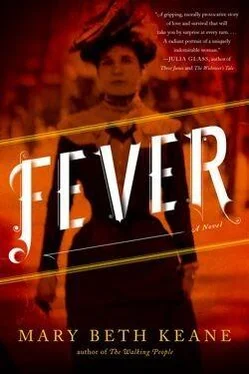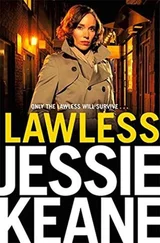“Jimmy,” she called out when she saw him coming almost two hours later, one set of hunched shoulders among so many. There was a ring of yellow sweat at his throat.
“Mary,” he said, and stepped away from the pack. His lunch pail was small in his large hand.
“Can I talk to you a second?”
“What’s happened?” he said, crossing his arms over his chest. “Did Patricia send you?”
“No,” Mary said, and hesitated. The other men were watching them. They were lined up now against a wall, some squatting, some standing, some sitting, spread legged. They pulled sandwiches and thermoses from the depths of their pockets and ate. She turned her back to them, so she could see only Jimmy.
“I wondered, um, if you ever found out where Alfred went.”
“What do you mean?”
“Don’t you remember looking for him last year? When there was a job here for him?”
“Sure. But did he disappear again?”
Mary blinked up at him. “What do you mean? Did you find him after that?”
“You mean you didn’t know?”
“Know what? I haven’t seen him.”
Jimmy took her by the elbow and led her over to the steps of City Hall.
“There was an accident, Mary. A fire. A lamp exploded in his hands and he got badly burned. He was in Willard Parker for months, and then at a hospital for burned people up in Harlem.”
Mary shook her head. “What are you talking about?”
“I found out only because I got so curious I went over to the stable one afternoon to see if they’d seen him. They said it happened right there, at the stable, just before Christmas in 1910.”
“Jesus Christ.”
“Then when he got out of the burn place he came down here looking for me, looking for work, I guess, but there wasn’t nothing to give him. So I says to him, ‘Briehof, what you should do is head west to one of the middle states. Good work there. Make yourself a little house.’ And I swear to God, Mary, I think he did it. I think he just went and did it, just like that. Crazy as a loon, that guy. You didn’t seem to want to talk about him so I told Patricia to tell you. I know you two don’t get on so well but I figured she’d told you or told Fran to tell you and you ladies had talked about it and decided what to think about it. And then I figured he’d write to you. He asked about you, you know.”
“No. No, Patricia didn’t tell me.”
Jimmy picked up his sandwich, and offered half to Mary. She took it gratefully.
“Where’s the hospital?”
“West 127th, I think. Maybe 128th. Between Broadway and Amsterdam.”
“Maybe they know where he went. Maybe they have an address.”
“I doubt it, Mary. When he came to see me it was November. Six months ago. And then if he headed west…”
How could he have traveled so far away without telling her? How could he have been so badly hurt without her knowing? They sat in silence, looking up at the top of the skyscraper. “Fifty-five stories,” Jimmy said. “You believe that?”
Mary could just make out the shape of a man on one of the beams near the top.
“But he was all right? Recovered? How bad was he burned?”
“Pretty bad. But he was better when I saw him.”
“Why didn’t Patricia tell me? You should have double-checked, Jimmy. You should have known Patricia wouldn’t tell me. I have a good mind to go up there and tell her what I think of her.”
Jimmy sighed. “Don’t take it up the wrong way, Mary, please. We have enough trouble.”
• • •
The burn hospital was newer than the buildings surrounding it, the stonework not yet blackened. She expected something like Willard Parker, or like Riverside, but it was a modest building, four stories, no sign of its purpose except for a small placard over the door with simple letters: St. John the Apostle Burn Recovery Hospital of Morningside Heights. There were trees lining the street and a group of young girls clustered around a toy pram. Mary rang the bell, and the door was answered by a nun dressed entirely in white. The nun ushered her into the small, marble-floored reception area. The halls were silent, and Mary glanced quickly up the stairs, at a large, stained-glass window on the landing between the first and second floors. Aside from Central Park, where it was possible to hear birds and crickets in summer, and aside from North Brother, it was the quietest place Mary had ever visited in Manhattan.
“I’m looking for a patient named Alfred Briehof,” Mary said to the nun in a whisper. The sound of a bed being rolled on casters echoed from an upper floor. “I know he’s been released, but I wondered if you had an address for him.”
“Briehof,” the nun said. “Excuse me.”
Bending her head so that Mary could not see the expression below her habit, the nun turned to a desk and pulled open a lower drawer. She ran her fingers across the names at the top of the files. Forward and back her fingers crawled. She closed the drawer and opened another, ran her fingers again.
“Briehof,” she announced, pulling a file out of the drawer. “Released,” she said once she’d looked it over. “Let’s see here. Yes, back in November. Pardon me. What is your relationship?” She glanced at Mary’s bag, which she’d placed on a bench in the waiting area.
Mary cleared her throat. “I’m his sister. Just found out about the accident. I’m visiting New York and this is the last place I have for him.”
“I see,” the nun turned back to the file and Mary prayed that it didn’t note anywhere that he was German. She considered what she’d say if the nun asked Mary to explain how brother and sister could have different accents.
“He signed himself out.”
“Is there a new address?”
“No. I’m sorry.”
Mary sighed. “Was he very bad?” The nun tipped the file so that it would flap open again.
“Hard to say,” she said after a moment of reading. “He was here for several months. That’s a long time. On the other hand, he’s alive. He left.”
“Yes,” Mary whispered. It was true. “Does it say anything about him going out west? To find work?”
The nurse shook her head. “No, but if he left the area that would explain why he missed his follow-up appointments. Patients with his injuries usually come in to get new prescriptions once a month.” Mary thought of all the states he’d ever mentioned wanting to see. How would she find him now?
A piece of paper slid out of the file and onto the floor.
“Wait,” the nun said. She read the sheet that had fallen. “I see. He stopped in just a few weeks ago with a few complaints. You were right. He’d been in Minnesota for a few months, but he returned just a few weeks ago and the doctor gave him new prescriptions. It references that he lives on 125th Street, but it doesn’t say East or West or any building number.”
The nun turned the paper over to check the back. “I suppose you could try the doctor’s office. Explain that you’re his sister.” The nun took a pencil from her pocket and scribbled the doctor’s address on a corner of the paper and then tore the corner off.
“Thank you.”
“I assume you already tried his next of kin?”
“Who?”
“His wife. I imagine she knows where he is. Though seeing her address now I wonder why he isn’t living with her. Perhaps their situation changed due to his injury.”
“His wife?” Mary tried to control her expression. “It’s been several years since I’ve seen my brother.”
“Well, he listed a wife when he was admitted,” the nun glanced down. “A Mary Mallon of East Thirty-Third Street.”
When Alfred woke, he was on his back, a pillow tucked under his head, another under his arm. A small, square window. A distant ceiling. A closed door. He shifted his leg and gasped at the pain it brought. Part of his body was covered with gauze. There was a lamp on the table beside his bed and he tried to turn toward it. He lifted his right arm and felt a brilliant heat light up inside his body and blossom forward, pushing out from his muscle and bone.
Читать дальше












